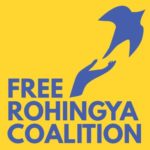Statement on UN-Myanmar Deal on Rohingya Return
ASIA-UPDATES ON MYANMAR ROHINGYA GENOCIDE, 11 Jun 2018
Free Rohingya Coalition – TRANSCEND Media Service
7 June 2018 – The Free Rohingya Coalition is gravely concerned about the non-inclusive, non-transparent nature of UN agencies signing a repatriation deal with Myanmar. The coalition demands protection of Rohingya people in both return and in rebuilding communities, as well as restoration of full-citizenship and recognition of group identity in Myanmar.
Frankfurt, Germany – We, the Free Rohingya Coalition, welcome the involvement of the two UN agencies, the Office of the UN High Commissioner for Refugees (UNHCR) and the UN Development Programme (UNDP) in supporting the creation of “conditions conducive to voluntary, safe, dignified, and sustainable refugee returns from Bangladesh, and their reintegration in the country.”
However, we are gravely concerned about several major aspects of the 6 June MOU.
Firstly, we are concerned about the lack of transparency regarding the details of the MOU, and the draft text has not been made available to the public or the media for scrutiny, beyond the reported twin-emphasis placed by UN on the respect for Rohingya group “identity” and the need for “safety”.
Secondly, there has been no Rohingya representation in the negotiations relating to this MOU, nor any mention of Rohingya representation in any future negotiations. This goes against the principals of inclusivity and participation that govern UN and development institutions. For an agreement that will profoundly impact the lives of 1 million Rohingyas – who have been deported and displaced into the neighbouring Bangladesh in periodic waves of exodus since the early 1990’s, the lack of transparency and Rohingya representation is both unacceptable and deeply concerning.
Thirdly, the UN references to “pathways to citizenship” and the UN’s acknowledgement that citizenship is “the government’s prerogative” troubles us deeply. This is an approach that has categorically failed since Rohingya repatriations from Bangladesh of the 1990s. What the Rohingyas need is not a gradual process towards a possible citizenship, at the mercy of Myanmar authorities, but the immediate restoration of our full and equal citizenship rights. Rohingya also require recognition of our ethnic group identity and the right to self-identify, which Rohingyas as a group fully and officially enjoyed previously in post-independence Myanmar. Official Myanmar documents -easily accessible- unequivocally support Rohingyas’ claims that we enjoyed full and equal citizenship rights, and our group identity was recognized as a native, ethnic minority of the Union of Burma.
Fourthly, we are also deeply concerned about UN agencies speculating about the ‘safety of Rohingya people.’ UNHCR, UNDP and other UN agencies have not been able to establish safe conditions for Rohingya since previous repatriations. In fact the situation has deteriorated under the watch of the UN in Myanmar. Troublingly, UN leadership in Myanmar has a poor track record on the ground with respect to Rohingyas’ need for international protection, defence of its group
identity, and the need to frontload human rights over UN’s amicable relations with Myanmar leaders who stand credibly accused of crimes against humanity and even genocide. Whilst unfettered access for these UN agencies is necessary, they are no substitute for institutions that can provide international protection for Rohingya and other communities of Rakhine State.
In light of the fact that “the four pillars of Myanmar” as a nation –that is the military, the NLD and political parties, the Buddhist Order and the predominantly Buddhist public – have rejected Rohingyas as an integral community of multi-ethnic Myanmar, it is vital that UNHCR and UNDP are clear, transparent and inclusive in establishing exactly what constitutes ‘safe conditions’ for return. This includes establishing what is needed to integrate our systematically persecuted
people into a society that has rallied behind Myanmar military’s mass killings and mass deportation of 700,000 Rohingyas in the past months, and how Rohingya will be protected in future from – not by – the Myanmar security forces.
Accountability for the well-documented atrocities committed by Myanmar military will help to end blanket impunity. Equally important, Rohingyas need international protection by state and regional actors, as well as the UN Peacekeepers in both the repatriation process and the rebuilding our bulldozed homes in North Rakhine State of Western Myanmar. We need a protected return to our protected homeland inside Myanmar.
__________________________________________
 The Free Rohingya Coalition (FRC) https://freerohingyacoalition.org/en/ is a global network of Rohingya activists and friends of Rohingyas who share common concerns about Myanmar’s on-going genocide and the need for Rohingya survivors to play an active role in seeking a viable future for their group.
The Free Rohingya Coalition (FRC) https://freerohingyacoalition.org/en/ is a global network of Rohingya activists and friends of Rohingyas who share common concerns about Myanmar’s on-going genocide and the need for Rohingya survivors to play an active role in seeking a viable future for their group.
Contact: Ro Nay San Lwin, Coordinator for Media Relations, Free Rohingya Coalition – Tel: +49 176 62139138; email: info@freerohingyacoalition.org
To access FACT SHEET on the Rohingya click: https://freerohingyacoalition.org/en/?page_id=62
PDF FILE: FRC-Statement-07-06-2018
This article originally appeared on Transcend Media Service (TMS) on 11 Jun 2018.
Anticopyright: Editorials and articles originated on TMS may be freely reprinted, disseminated, translated and used as background material, provided an acknowledgement and link to the source, TMS: Statement on UN-Myanmar Deal on Rohingya Return, is included. Thank you.
If you enjoyed this article, please donate to TMS to join the growing list of TMS Supporters.

This work is licensed under a CC BY-NC 4.0 License.
Read more
Click here to go to the current weekly digest or pick another article:
ASIA-UPDATES ON MYANMAR ROHINGYA GENOCIDE: